
Russell J. Verney is a political advisor, who served as chairman of the Reform Party of the United States from 1995 to 1999. He worked on the presidential campaigns of Ross Perot and Bob Barr.

Russell J. Verney is a political advisor, who served as chairman of the Reform Party of the United States from 1995 to 1999. He worked on the presidential campaigns of Ross Perot and Bob Barr.
In the early 1990s, Verney served as the Democratic Party State Treasurer in New Hampshire. [1] By 1992, he was the party's executive director for the state. [2] Later that year, he joined Ross Perot's campaign and worked as the candidate's spokesman and top advisor, [3] helping the candidate win 19% of the popular vote and participation in a three-way presidential debate. After the campaign, he served as a coordinator and spokesman for Perot's organization United We Stand America, which opposed the North American Free Trade Agreement. [4] By 1995, he was the organization's National Executive director. [5] That same year, the group helped form the Reform Party of the United States. Verney labeled this "the most significant thing that's happened in American politics in 130 years." [6]
Verney served as the party's first chairman and as director for Perot's 1996 presidential campaign. [7] Under the party's banner, Perot won 8.4% of the national vote in the 1996 presidential election and in 1998, former wrestler Jesse Ventura was elected Governor of Minnesota.
After Ventura made comments in Playboy Magazine that offended some members of the party, Verney sent a letter to Governor Ventura, asking for his resignation from the party for his comments "about religion, sexual assault, overweight people, drugs, prostitution, women's undergarments and many other subjects [that] do not represent the values, principles or ethics upon which this party was built." In the letter, he admonished Ventura for bringing "shame to yourself and disgrace to the members of the Reform Party." Ventura had no response to the request. [8]
He did not run for re-election in 1999 as the party's chairman, commenting that it was time for someone else to hold the position. To his chagrin, Jack Gargan, a close ally of Jesse Ventura, was elected to the position. He sparred often with Verney, whom Gargan and Ventura felt had operated the party in a dictatorial fashion for too long. [9]

Hoping to decrease the influence of Ventura, Verney convinced Pat Buchanan to run for the party's presidential nomination in 2000. However, Verney soon became upset with Buchanan's socially conservative positions, explaining that he was attempting to change the party into an "ideologically pure right-wing party." [10] Eventually, the Reform Party split after Verney led a walk-out that protested Pat Buchanan's nomination. [11]
The New York Times ran an article on Verney, discussing how he stayed with one faction of the Reform Party as it continued its reduction following Perot's campaigns and the 2000 split. Verney stated that he would eventually leave the party, but that he "would never really leave Ross [Perot]" because, in his words, "I love the man. He's my hero." [12]
Verney served as former Republican Congressman Bob Barr's campaign manager for his presidential run as the nominee of the Libertarian Party in 2008. [13] Barr finished the race in fourth place with 0.4% of the vote. [14]

Presidential elections were held in the United States on November 5, 1996. Incumbent Democratic President Bill Clinton and his running mate, incumbent Democratic Vice President Al Gore were re-elected to a second and final term, defeating the Republican ticket of former Senate Majority Leader Bob Dole and former Secretary of Housing and Urban Development Jack Kemp and the Reform ticket of businessman Ross Perot and economist Pat Choate.

Presidential elections were held in the United States on November 3, 1992. Democratic governor Bill Clinton of Arkansas defeated incumbent Republican president George H. W. Bush and independent businessman Ross Perot of Texas. The election marked the beginning of a period of Democratic dominance and the end of a period of Republican dominance in American presidential politics that began in 1968, and also marked the end of 12 years of Republican rule of the White House.

Henry Ross Perot Sr. was an American businessman, politician and philanthropist. He was the founder and chief executive officer of Electronic Data Systems and Perot Systems. He ran an independent campaign in the 1992 U.S. presidential election and a third-party campaign in the 1996 U.S. presidential election as the nominee of the Reform Party, which was formed by grassroots supporters of Perot's 1992 campaign. Although he failed to carry a single state in either election, both campaigns were among the strongest presidential showings by a third party or independent candidate in U.S. history.

The Reform Party of the United States of America (RPUSA), generally known as the Reform Party USA or the Reform Party, is a centrist political party in the United States, founded in 1995 by Ross Perot.
United We Stand America was the name selected by Texas businessman H. Ross Perot for his citizen action organization after his 1992 independent political campaign for President of the United States. Perot's 19% showing in the 1992 election was sufficient to entitle him to federal matching funds for the 1996 campaign. After the campaign, Perot announced, on January 11, 1993, the formation of a non-profit watchdog organization named United We Stand America (UWSA).
John "Jack" Gargan was an American financial consultant who became the second chairman of the Reform Party started by Ross Perot. He is also known for the creation of Throw the Hypocritical Rascals Out (T.H.R.O.), an organization whose platform was to vote out all incumbent members of Congress and to set term limits on all members of Congress. He is considered the "father" of the American term limits movement.
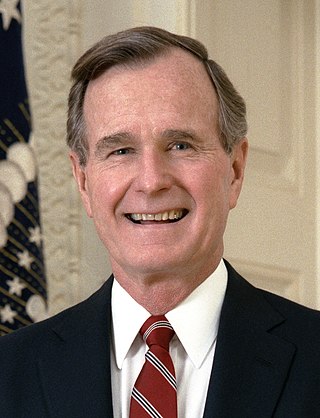
Presidential primaries and caucuses of the Republican Party took place within all 50 U.S. states and the District of Columbia between February 18 to June 9, 1992. The contests chose the 2,277 delegates sent to the national convention in Houston, Texas from August 17 to August 20, 1992, who selected the Republican Party's nominees for president and vice president in the 1992 United States presidential election and approved the party's platform. President George H. W. Bush was again selected as the nominee. The Republican ticket of President Bush and Vice President Dan Quayle went on to lose the general election to the Democratic ticket of Arkansas Governor Bill Clinton and Tennessee Senator Al Gore.

From January 29 to June 4, 1996, voters of the Republican Party chose its nominee for president in the 1996 United States presidential election. Senator Bob Dole of Kansas, the former Senate majority leader, was selected as the nominee through a series of primary elections and caucuses culminating in the 1996 Republican National Convention held from August 12 to 15, 1996, in San Diego, California. Dole resigned from the Senate in June 1996 once he became the presumptive nominee to concentrate on his presidential campaign. He chose Jack Kemp as his running mate.

In 1992, Ross Perot ran unsuccessfully as an independent candidate for President of the United States. Perot was a Texas industrialist who had never served as a public official, but he had experience as the head of several successful corporations and had been involved in public affairs for the previous three decades. Grass-root organizations sprang up in every state to help Perot achieve ballot access following his announcement on the February 20, 1992, edition of Larry King Live. James Stockdale, a retired Navy vice admiral, was Perot's running mate.

The 2008 presidential campaign of Bob Barr, former Congressman of Georgia began on May 12, 2008. He announced his candidacy for the Libertarian Party's president after months of grassroots draft efforts. Barr was criticized by Libertarians who opposed his efforts in Congress, which included sponsorship of the Defense of Marriage Act and votes in favor of the USA PATRIOT Act and authorization of the War in Iraq, but he was supported by others who accepted his regret for those positions. Barr won the party's nomination after six rounds of balloting at the 2008 Libertarian Party National Convention. Former contender Wayne Allyn Root was named as his running mate. Reason magazine senior editor Radley Balko called Barr "the first serious candidate the LP has run since I've been eligible to vote."
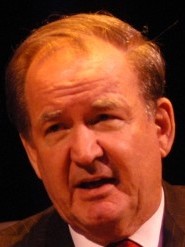
Following Ross Perot's impressive showing during the 1996 presidential election, the Reform Party of the United States of America became the country's largest third party. The party's 2000 presidential candidate would be entitled to $12.5 million in matching funds. Several high-profile candidates vied for the nomination, including future President Donald Trump, Pat Buchanan, and physicist John Hagelin. For a brief time, Congressman John B. Anderson and Congressman Ron Paul, who previously ran third party campaigns for President in 1980 and 1988 respectively, were considered potential candidates. Both Anderson and Paul ultimately declined to seek the nomination.

The 2000 United States presidential election in California took place on November 7, 2000, as part of the wider 2000 United States presidential election. Voters chose 54 representatives, or electors to the Electoral College, who voted for president and vice president.
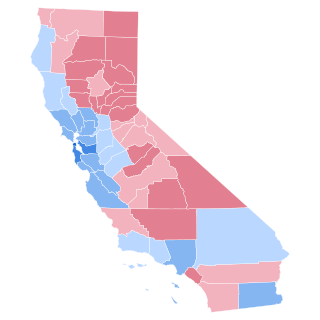
The 1996 United States presidential election in California took place on November 5, 1996, as part of the 1996 United States presidential election. Voters chose 54 representatives, or electors to the Electoral College, who voted for president and vice president. California, was won by Incumbent President Bill Clinton (D) over Senator Bob Dole (R), with Clinton winning 51.1% to 38.21% by a margin of 12.89%. Billionaire businessman Ross Perot finished in third, with 6.96% of the popular vote.

The Independence—Alliance Party, a merger of the Alliance Party and the Independence Party, formerly the Reform Party of Minnesota (1996–2000), is a political party in the U.S. state of Minnesota. It was the party of former Minnesota governor Jesse Ventura when he left the Reform Party.

The 2000 presidential campaign of Pat Buchanan, conservative pundit and advisor to both President Richard Nixon and Ronald Reagan, was formally launched on March 2, 1999, as Buchanan announced his intention to seek the Republican Party nomination for the presidency of the United States in the 2000 presidential election. It marked Buchanan's third primary campaign for the presidency, following his bids in 1992 and 1996. Although he had not attained the nomination either time, he had been regarded as a consequential party figure. Early primary surveys found Buchanan polling in the single digits and following the publication of his book A Republic, Not an Empire, which generally advocated for noninterventionist and "America first" foreign policy, some within the Republican Party condemned Buchanan's foreign policy views. There began to be speculation that Buchanan would leave the Republican Party in favor of the Reform Party, a third party qualified for matching federal campaign funds.
The Reform Party of New Jersey, also known as New Jersey Reform Party, was originally founded as the state party organization for New Jersey of the Reform Party of the United States of America.
The 2000 United States presidential debates were a series of debates held during the 2000 presidential election.
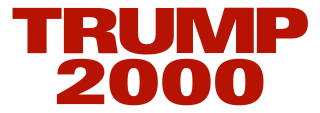
New York real estate magnate Donald Trump announced the creation of a presidential exploratory committee on the October 7, 1999, edition of Larry King Live on CNN. Although Trump had never held elected office, he was well known for his frequent comments on public affairs and business exploits as head of The Trump Organization. He had previously considered a presidential run in 1988 as a Republican, but chose not to run. For 2000, Minnesota Governor Jesse Ventura persuaded Trump to seek the presidential nomination of the Reform Party, which was fracturing despite achieving ballot access and qualifying for matching funds as a result of businessman Ross Perot's 1996 presidential campaign on the party's ticket.

The 1996 presidential campaign of Ross Perot, an independent presidential candidate in 1992 and the founder of the Reform Party, was announced on July 10, 1996. Perot said he would seek the Reform Party nomination for president of the United States in the 1996 election during an appearance on Larry King Live.
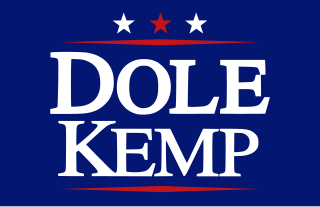
The 1996 presidential campaign of Bob Dole began when Republican Senator and Senate Majority Leader Bob Dole formally announced his candidacy for Republican Party nomination in 1995. After beating other candidates in the primaries, he became the Republican nominee, with his opponent being Democratic incumbent President Bill Clinton in the 1996 presidential election. Dole conceded defeat in the race in a telephone call to Clinton on November 5, 1996. Dole is the only person in the history of the United States to lose elections for both president and vice president.